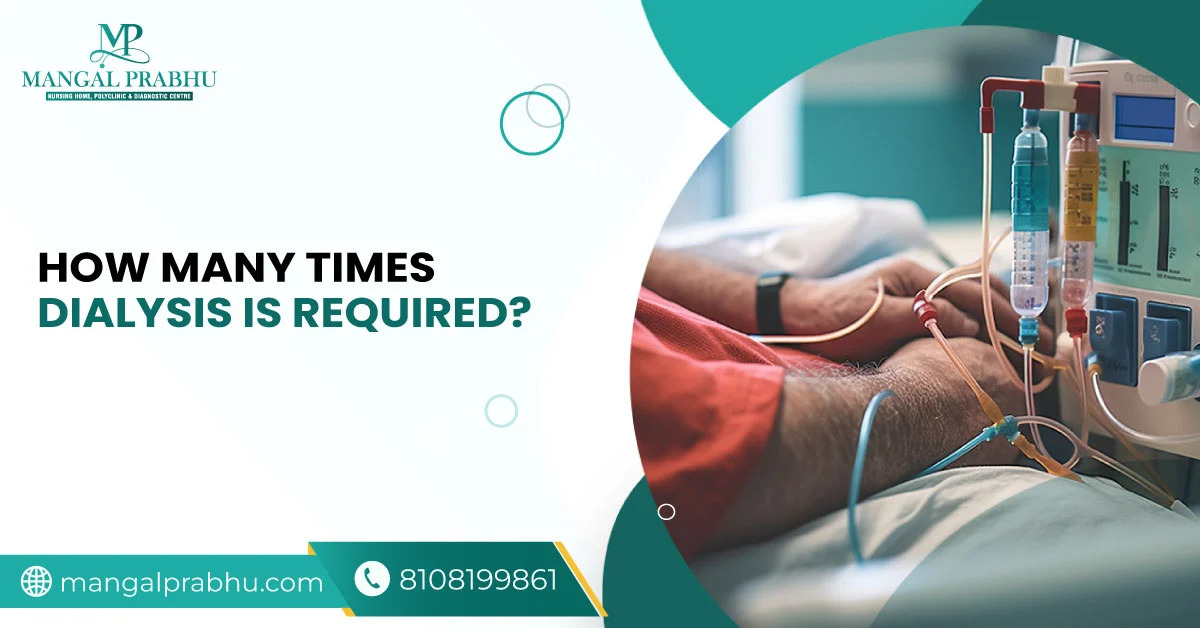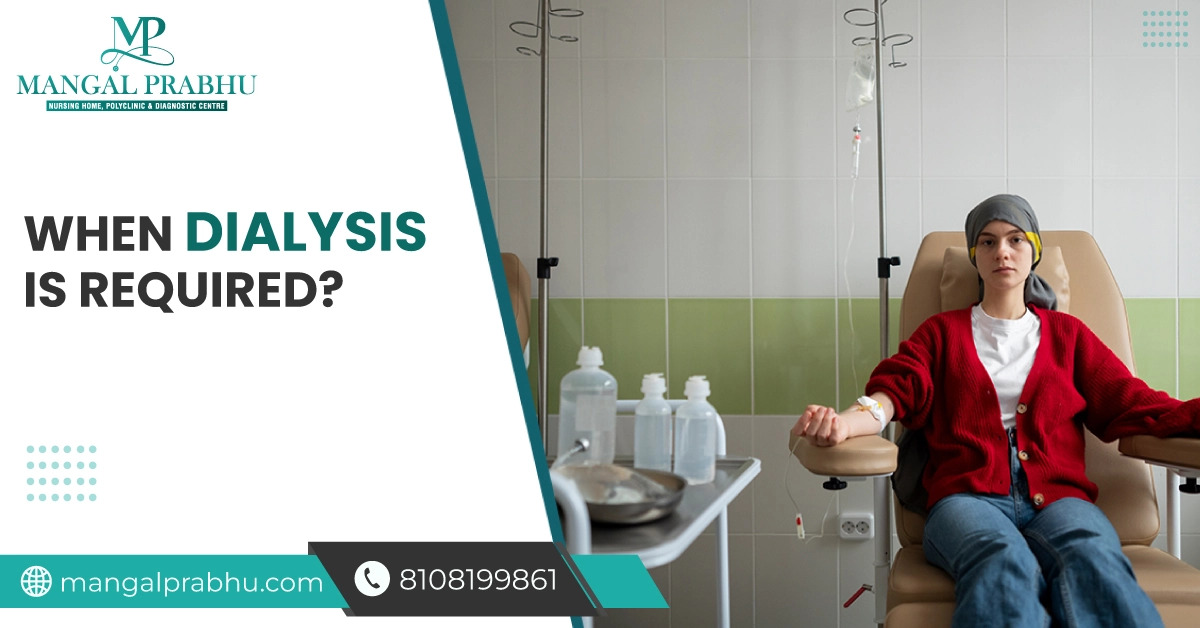
How Many Times Dialysis is Required?
Your kidneys filter blood by removing waste products and excess fluid from your body through urine. Some autoimmune diseases, diabetes, and other medical conditions can result in kidney failure. If it reaches a point where your kidneys are unable to drain excess liquid from your body, a dialysis or a kidney transplant is needed.
Dialysis performs the kidneys’ function by removing excess waste from the bloodstream. If you experience nausea, vomiting, fatigue, and swelling, visit the nearest dialysis center in Navi Mumbai and get evaluated by a nephrologist.
Factors Influencing Dialysis Frequency
Unlike kidney transplants, dialysis is not a one-time procedure. You need to schedule the treatment every week or more frequently depending on your health, the stage of kidney disease, and your doctor’s recommendation.
So, the question is, how often do you need to undergo dialysis? Let’s check out the factors that influence the frequency of this treatment.
1) Severity of the Disease:
The dialysis frequency depends on the stage of your kidney disease. If your kidney hasn’t lost its function completely, you will have fewer dialysis sessions than someone diagnosed with end-stage renal disease.
2) Type of Dialysis:
Hemodialysis is done 3-4 times weekly at a dialysis clinic. Peritoneal dialysis must be done daily.
3) Your Health:
People with diabetes, high blood pressure, and other medical illnesses that weaken their immune system might require more frequent dialysis sessions than others.
4) Doctor’s Recommendation:
Your nephrologist will assess your condition and recommend changes in the dialysis frequency based on how well your body responds to the treatment.
5) Symptoms:
If your symptoms worsen or you notice a sudden change in your health, you might have to get dialysis more frequently to manage your condition.
Standard Dialysis Schedule
Hemodialysis is the most common procedure in which blood is removed from the body and diverted to artificial kidneys, where it’s filtered and returned to the body. The procedure can last between 3 and 5 hours and is carried out 3-4 times a week, depending on your health and the severity of the disease.
You can also schedule hemodialysis five times a week and reduce the duration of each procedure to three hours. Peritoneal dialysis is done more frequently, about four times a day, and it takes up to 40 minutes per session.
Can You Change the Frequency of the Dialysis?
The frequency of kidney dialysis treatment in Navi Mumbai can be adjusted based on your health, kidney status, symptom management, and lab results (to name a few). Likewise, the frequency of the dialysis changes when you switch the type of dialysis treatment (from hemodialysis to peritoneal dialysis or vice versa).
If you are considering changing the dialysis frequency or the type, make sure you discuss it with your nephrologist first. They will offer better guidance. You must also notice your symptoms and schedule follow-up visits regularly.
Conclusion
Discuss your health and lifestyle with a nephrologist. They will guide you in choosing the best type of dialysis procedure. Home dialysis offers better flexibility. Talk to your doctor to learn more about the frequency of dialysis that will best fit your condition.

When is Dialysis Required?
Your kidneys are responsible for removing waste from your bloodstream and the extra fluid through urine. This bean-shaped organ also maintains the level of potassium, calcium, and other vital minerals in your body. Kidney failure can lead to the accumulation of waste and extra fluid in your bloodstream. It’s important to consult a Nephrologist in Navi Mumbai to get a dialysis—a procedure that performs the function of your kidneys. Let’s see when it’s needed.
Symptoms of Kidney Failure
Here’s what happens if one or both of your kidneys stop working.
- Nausea and vomiting
- Feeling the urge to urinate frequently
- A metallic taste in the mouth
- Lost appetite
- Edema
- Muscle cramps
- Fatigue
- Dry skin
The symptoms are worse in people with high levels of waste substances in their blood.
When is Dialysis Required?
If your kidney is unable to clear toxins from your blood or remove excess fluid from your body through urine, you might need dialysis. The procedure is mainly recommended when only 10-15 percent of your kidney function is left.
If your kidneys stop working, you will notice swelling around the ankles, nausea, vomiting, and extreme fatigue. However, it’s possible that the toxic substances build up gradually in your bloodstream without causing these symptoms. So, it’s best to talk to your doctor to know if you need dialysis treatment in Navi Mumbai.
Types of Dialysis
Dialysis is categorized into two types:
i) Hemodialysis:
This procedure involves removing toxins from your bloodstream through an artificial kidney. The blood from your body passes through this machine to eliminate waste, and the purified blood is returned to your body. The procedure takes 4-5 hours and is performed in an outpatient setting in a dialysis center.
ii) Peritoneal Dialysis:
In peritoneal dialysis, a catheter is inserted into your abdomen and used to pass the dialysis solution (which consists of a special formula that removes toxic elements from your blood) into the peritoneum. This solution removes excess fluid and waste from the blood within your body. The waste must be drained after the procedure.
Peritoneal dialysis is a more convenient option for patients who can’t schedule regular trips to the hospital, but it comes with a few complications, like infection and hernia.
Life After Dialysis
Life after dialysis isn’t different from normal life. Your healthcare provider will give you instructions on how to keep your dialysis solution and bags clean. You can travel, work, and perform all routine tasks as usual. However, if you are traveling, you may need to arrange the dialysis sessions at the local dialysis center in your destination address. Those undergoing peritoneal dialysis can carry portable dialysis machines, solutions, and drainage bags with them.
Conclusion
A person can survive with one kidney, but if both of them stop working, dialysis or a kidney transplant is necessary. Kidney failure can occur suddenly or gradually. People with diabetes, hypertension, and other kidney diseases are at an increased risk of kidney failure. If you are diagnosed with kidney failure, dialysis can help you live a healthier and normal life.
